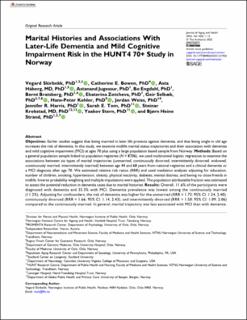Marital Histories and Associations With Later-Life Dementia and Mild Cognitive Impairment Risk in the HUNT4 70+ Study in Norway
Skirbekk, Vegard Fykse; Bowen, Catherine E; Håberg, Asta; Jugessur, Astanand; Engdahl, Bo Lars; Bratsberg, Bernt Magne; Zotcheva, Ekaterina; Selbæk, Geir; Kohler, Hans-Peter; Weiss, Jordan; Harris, Jennifer Ruth; Tom, Sarah; Krokstad, Steinar; Stern, Yaakov; Strand, Bjørn Heine
Peer reviewed, Journal article
Published version
Permanent lenke
https://hdl.handle.net/11250/3040159Utgivelsesdato
2022Metadata
Vis full innførselSamlinger
- Artikler [5068]
- Publikasjoner fra CRIStin FHI [7544]
Sammendrag
Objectives: Earlier studies suggest that being married in later life protects against dementia, and that being single in old age increases the risk of dementia. In this study, we examine midlife marital status trajectories and their association with dementia and mild cognitive impairment (MCI) at ages 70 plus using a large population based sample from Norway. Methods: Based on a general population sample linked to population registries (N = 8706), we used multinomial logistic regression to examine the associations between six types of marital trajectories (unmarried, continuously divorced, intermittently divorced, widowed, continuously married, intermittently married) between age 44 and 68 years from national registries and a clinical dementia or a MCI diagnosis after age 70. We estimated relative risk ratios (RRR) and used mediation analyses adjusting for education, number of children, smoking, hypertension, obesity, physical inactivity, diabetes, mental distress, and having no close friends in midlife. Inverse probability weighting and multiple imputations were applied. The population attributable fraction was estimated to assess the potential reduction in dementia cases due to marital histories. Results: Overall, 11.6% of the participants were diagnosed with dementia and 35.3% with MCI. Dementia prevalence was lowest among the continuously married (11.2%). Adjusting for confounders, the risk of dementia was higher for the unmarried (RRR = 1.73; 95% CI: 1.24, 2.40), continuously divorced (RRR = 1.66; 95% CI: 1.14, 2.43), and intermittently divorced (RRR = 1.50; 95% CI: 1.09, 2.06) compared to the continuously married. In general, marital trajectory was less associated with MCI than with dementia. In the counterfactual scenario, where all participants had the same risk of receiving a dementia diagnosis as the continuously married group, there would be 6.0% fewer dementia cases. Discussion: Our data confirm that staying married in midlife is associated with a lower risk of dementia and that divorced people account for a substantial share of dementia cases.
